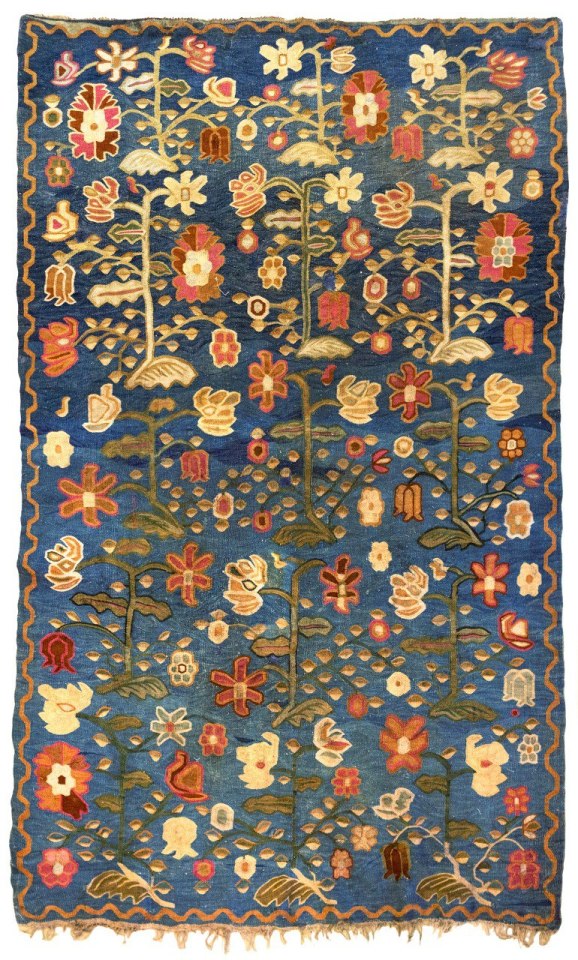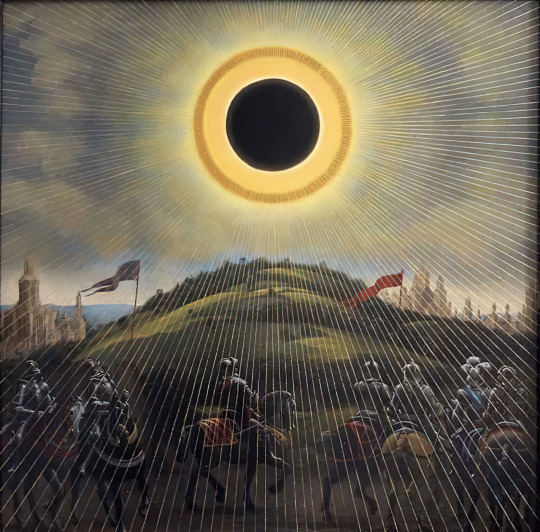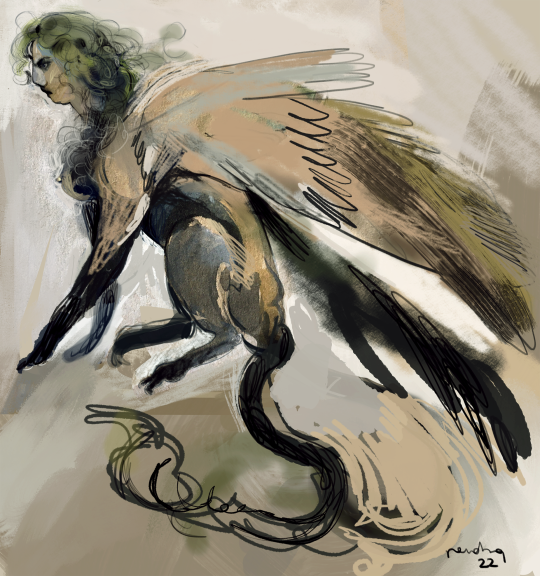ribs by the crane wives, writing sideblog, queer fantasy stories, header by billelis, icon by john william waterhouse
Don't wanna be here? Send us removal request.
Text
haha thats so funny [face gets gravely serious] but were you not a staunch and trusted ally i would have you executed for such a joke
24K notes
·
View notes
Text
🍖 How to Build a Culture Without Just Inventing Spices and Necklaces
(a worldbuilding roast. with love.)
So. You’re building a fantasy world, and you’ve just invented: → Three types of ceremonial jewelry → A spice that tastes like cinnamon if it were bitter and cursed → A holiday where everyone wears gold and screams at dawn
Cute. But that’s not culture. That’s aesthetics.
And if your worldbuilding is all outfits, dances, and spice blends with vaguely mystical names, your story’s probably going to feel like a cosplay convention held inside a Pinterest board.
Here’s how to fix that—aka: how to build a real, functioning culture that shapes your story, not just its vibes.
─────── ✦ ───────
🔗 Culture Is Built on Power, Not Just Style
Ask yourself: → Who’s in charge, and why? → Who has land? Who doesn’t? → What’s considered taboo, sacred, or punishable by death?
Culture is shaped by who gets to make the rules and who gets crushed by them. That’s where things like religion, family structure, class divisions, gender roles, and social expectations actually come from.
Start there. Not at the embroidery.
─────── ✦ ───────
2.🪓 Culture Comes From Conflict
Did this society evolve peacefully? Was it colonized? Did it colonize? Was it rebuilt after a war? Is it still in one?
→ What was destroyed and mythologized? → What do the survivors still whisper about? → What do children get taught in school that’s… suspiciously sanitized?
No culture is neutral. Every tradition has a history, and that history should taste like blood, loss, or propaganda.
─────── ✦ ───────
3.🧠 Belief Systems > Customs Lists
Sure, rituals and holidays are cool. But what do people believe about: → Death? → Love? → Time? → The natural world? → Justice?
Example: A society that believes time is cyclical vs. one that sees time as linear will approach everything—from prison sentences to grief—completely differently.
You don’t need to invent 80 gods. You need to know what those gods mean to the people who pray to them.
─────── ✦ ───────
4.🫀 Culture Controls Behavior (Quietly)
Culture shows up in: → What people apologize for → What insults cut deepest → What people are embarrassed about → What’s praised publicly vs. what’s hidden privately
For instance: → A culture obsessed with stoicism won’t say “I love you.” They’ll say “Have you eaten?” → A culture built on legacy might prioritize ancestor veneration, archival writing, name inheritance.
This stuff? Way more immersive than giving everyone matching earrings.
─────── ✦ ───────
5. 🏠 Culture = Daily Life, Not Just Festivals
Sure, your MC might attend a funeral where people paint their faces blue. But what about: → Breakfast routines? → How people greet each other on the street? → Who cooks, and who eats first? → What’s considered “clean” or “proper”? → How is parenting handled? Divorce?
Culture is what happens between plot points. It should shape your character’s assumptions, language, fears, and habits—whether or not a festival is going on.
─────── ✦ ───────
6. 💬 Let Your Characters Disagree With Their Own Culture
A culture isn’t a monolith.
Even in deeply traditional societies, people: → Rebel → Question → Break rules → Misinterpret laws → Mock sacred things → Act hypocritically → Weaponize or resist what’s expected
Let your characters wrestle with the culture around them. That’s where realism (and tension) lives.
─────── ✦ ───────
7.🧼 Beware the “Pretty = Good” Trap
Worldbuilding gets boring fast when: → The protagonist’s homeland is beautiful and pure → The enemy’s culture is dark and “barbaric” → Every detail just reinforces who the reader should like
You can—and should—challenge the aesthetic hierarchy. → Let ugly things be beloved. → Let beautiful things be corrupt. → Let your MC romanticize their culture and then get disillusioned by it later.
─────── ✦ ───────
📍 TL;DR (but like, spicy): → Culture is not food and jewelry. → Culture is power, fear, memory, contradiction. → Stop inventing spices until you know who starved last winter. → Let your world feel lived in, not curated.
The best cultural worldbuilding doesn’t look like a list. It feels like a system. A pressure. A presence your characters can’t escape—even if they try.
Now go. Build something real. (You can add spices later.)
—rin t. // writing advice for worldbuilders with rage and range // thewriteadviceforwriters
Sometimes the problem isn’t your plot. It’s your first 5 pages. Fix it here → 🖤 Free eBook: 5 Opening Pages Mistakes to Stop Making:
🕯️ download the pack & write something cursed:
3K notes
·
View notes
Text
Neither enemies to lovers nor slow burn but a secret third thing called Schrödinger's intimacy. We are in love and we are not in love do NOT open that lid I swear to God.
28K notes
·
View notes
Text
Hey I don't know if anyone's ever said this before, but, writing a novel... is kind of difficult.
1K notes
·
View notes
Text

Ukrainian carpet from Helmyaziv, Cherkasy region, late 19th century.
4K notes
·
View notes
Text
Idea for a Generic Medieval Fantasy Setting: The characters refer to their nameday as an apparent stand-in for birthdays, celebrating it annually according to their respective preferences and perhaps family customs, as one does. People talk about things that happened before someone's time as having gone down "before you were named", someone grievously insults an opponent on the battlefield by going "your mother should never have named you." So with the way naming is always talked about, as a reader you start to somewhat assume from context clues that these people have some sort of a taboo about the word "birth" or something, and naming is used as some sort of an euphenism to avoid naming the process in which people come into the world.
Then somewhere halfway through the story it turns out that in this setting, people aren't named immediately after being born. This is a semi-realistic-gritty fantasy setting, after all. Due to the somewhat high infant mortality, to at least somewhat soften the blow of potentially losing a child, babies just aren't named before the parents are pretty confident that the kid is going to survive. The naming ceremony is where a baby is officially aknowledged as an entire individual, a member of the family and a legally existing person, instead of just a gurgling extension of the mother who may or may not disappear from this world. And that timespan between birth and being named is - depending on the situation and the family - somewhere between 1-4 years.
And suddenly the whole bunch of annoyingly-too-mature teenagers and other weird remarks about age start making sense in hindsight. The heroine protagonist who celebrated her 16th nameday at the start of the story is actually 19 years old. The wild difference in maturity between two characters who were both named the same year wasn't just a difference in backgrounds, The Rich Idiot isn't just rosy-cheeked and naive due to being sheltered growing up, but actually literally years younger than a peasant "of the same age". A character who's sickly and was frequently remarked to look much older than their years hasn't just been harrowed by their illness, but was not named before the age of seven because their parents didn't think they'd survive.
11K notes
·
View notes
Text
What if we were a family of sacrificial lambs, what if we would all walk ourselves to the slaughter if it meant the others would survive, what if we all died to save each other, what if it happened again and again and again? What if you died in front of me and each time it was worse instead of easier? What if I died in front of you and you didn't understand that I had to because I couldn't live in a world without you in it but I could subject you to a world without me in it. What if I could live with that betrayal but only because I wouldn't actually have to live, the offender, the one who stained my hands with my own blood? What if you died in front of me and this time you didn't come back?
32 notes
·
View notes
Text

Studies into the Past (Études sur le passé)
by Laurent Grasso
6K notes
·
View notes
Text
big fan of stories that, while undoubtedly being about the power of friendship, acknowledge that the power of incredible violence is just as important
the love was there. the love changed everything. the crowbar helped also
48K notes
·
View notes
Text
The combination of 'unnervingly flawless self-control' with 'occasional tendency to engage in reckless, dangerous, and borderline self-destructive or death-seeking behaviour' in a character is SUCH catnip to me
41K notes
·
View notes
Photo


“Frithrah” and “Excessive Negligence” by Laura Benson. Creatures of Self Series.
both approx 5x7 inches, gelli-plate print in solder frame, 2022.
5K notes
·
View notes
Text
knight/lord ships are like. what if i would die for you. what if i wanted you to live for me. what if i wanted to touch you but could only be satisfied with being near you. what if i could touch you but only through the safety of our gloves. what if i couldn’t stop thinking about you right next to me. what if i bloodied my hands for you and never looked back at the wreckage. what then
75K notes
·
View notes
Text
First base is beating the shit out of each other second base is having a civil conversation
85K notes
·
View notes



